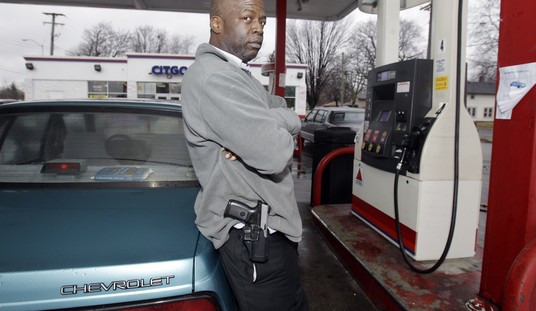The senior enlisted man in Afghanistan serving with Gen. Stanley A. McChrystal, who stood with the general in the White House when President Barack Obama took away his command, recalled to Human Events serving with the general, whose new book “My Share of the Task” is now a New York Times bestseller.
Every relationship between a command sergeant major and the commander is different and it depends on how that commanding officer wants the relationship to support him and execute his priorities, said retired Command Sgt. Maj. Michael T. Hall, who was the theater CSM in Afghanistan with the general.
The two men had the same partnership in the late 1ate 1990s when McChrystal was the commanding officer of the 75th Ranger Regiment. Hall was also the CSM for the Joint Special Operations Command and Army Special Forces Command both at Fort Bragg, N.C.
“What it really boils down to is that every NCO gets his authority and responsibilities from the commanding officer,” he said.
A good CSM can take on the commander’s secondary priorities as his own, freeing him to focus on the things at the top of his list, he said. “Really your biggest enemy and your biggest asset is time.”

Hall, who grew up outside of Cleveland, Ohio, now works with the general at McChrystal Group, his Alexandria, Va.-based leadership consulting firm. The new company teaches organizations how to leverage communications and leadership to become more effective through its “CrossLead” process.
“CrossLead is really all about shared consciousness and purpose,” he said. “Everybody in the organization truly understands what they are trying to accomplish.”
Hall had retired from the Army when he got the surprise phone call from McChrystal in the summer of 2009 asking him to join him in Afghanistan as the theater command sergeant major, a decision he made after already being out of the service for more than a year following 32 years in the Army, he said. “Nah, I wasn’t expecting it all.”
It was a 32-year career that included more than 20 years in the Rangers, the Army’s elite light infantry corps, he said.
The career ended shortly after McChrystal was relieved by the president.
The president was reacting to the June 22, 2010 article in Rolling Stone magazine by Michael Hastings, who attributed to members of the general’s command group comments unflattering to the president, Vice-President Joseph R. Biden Jr., the French, and presented a culture many Americans besides the president were uncomfortable with.
McChrystal’s book deals with the controversy around the article, but mostly it is the story about a professional soldier from the end of Vietnam to the Global War on Terror. It begins with his four years at the U.S. Military Academy at West Point, N.Y., and carries the reader through to his retirement ceremony on the parade field at Washington’s Fort McNair.
In the book, the general makes the point that an inspector general’s report determined that many of the incidents reported by Hastings did not happen and others have come forward to say they were misquoted, but in the end, his command of NATO mission in support of the International Security Assistance Force fighting anti-Afghani forces ended when pre-publication copies of the articles flew through the Internet.
The meeting with the president at the White House was a mere formality.
The Rolling Stone article controversy meant the general had to go.
Hall said he does not remember details about Hastings visiting the ISAF command group because there were many reporters and there were many interviews. “I talked to a lot of guys.”
When the story was hit the Internet, an aide woke up ISAF’s commanding general at 2 a.m., but he went back to sleep, not yet cognizant of the political firestorm it stirring in Washington. McChrystal said he was given the impression that the article would portray the healthy teamwork at ISAF between the NATO partners.
Hall said everyone in the command group reacted differently.
“Some people thought it was serious, some people thought it wasn’t serious,” he said.
“There were a lot of people out there relying on us to do our jobs, so they could do their jobs, so we just tried to stay focused, because there was a war going on and people were getting hurt and this distraction had nothing to do with the 99.99 percent of the people in Afghanistan—so it was: Just do your job and don’t worry about it,” he said.
When the time came for McChrystal to meet with the president, Hall took the journey with him out of Afghanistan to Washington, the White House, he said.
The retired command sergeant major said the interactions in the White House just seem like a blur to him now.
He does not discuss the details because the general is uncomfortable talking about it, he said.
“I traveled with him more as a friend than as his command sergeant major, nobody knew what was going to happen, nobody knew whether General McChrystal was going to say, or what the president was going to say, and I was just there to be a friend,” he said.
“If he wanted to talk—or whatever, I was just there to be a friend,” he said.
McChrystal illustrates his partnership with Hall, in a story about the day an explosion outside the ISAF headquarters disrupted the general’s morning battle update brief that the general presided over.
The briefing was a theater-wife conference call with slides with downtrace units giving reports to the commanding general.
“It was the standard morning meeting, nothing special about it, there are a whole lot of things going on in Afghanistan, obviously, but nothing special about this day,” he said.
“We were probably a quarter, maybe half-way through the middle of the meeting when we felt the explosion—the building shook because it was an old building.”
Just after the blast, there was confusion inside the headquarters as to what to do, until the order was given to evacuate the building, he said. The blast came Aug. 15, 2009, five days before the national election.
McChrystal wrote, “A voice came on the sound system immediately directed the briefing to end and all personnel to depart the operations center. Mike Hall leaned over to me, ‘And where are we going to go, to the bunkers? What will we accomplish there?’”
The general said Hall then gave him sage advice: “I suggest we let the people responsible for securing the compound do their jobs, and we can stay and do ours.” The briefing continued and it became a part of the operations center culture that they would continue working thorough attacks at, near or around the building.
Hall said he was just being practical.
It just didn’t make any sense to him that they were the ISAF leadership and they would be cut off from operations in a bunker waiting for the “All-Clear,” he said.
Hall said he did not know what to expect and that is how his Army career started.
“My story is that it was one of the things you did back then where I grew up, you went to high school and you went in the service and you served for a little bit, then you came back and you went to college, or you went to work for Ford Motor Company or U. S. Steel or something,” he said.
Serving for a little bit became a career after he reported to Fort Benning, Ga. for duty with the Rangers for his first assignment after Boot Camp, he said.
“I was really, really lucky, I started with the 1st Ranger Battalion, it was a really good unit with really good leaders,” he said. “I like to say that the first day I walked in after initial training, A Company, 1st Ranger Battalion, it just seemed like I found the 10 best friends I would have in the world.”
Although Rangers were not new to the Army, in his book, McChrystal wrote that in the tumult after the Vietnam War, the Army decided to establish two Ranger battalions as islands of excellence, where the the craft of infantry would be practiced at the highest level and then shared with the rest of the Army, when it stabilized. There are now four Ranger battalions.
The retired command sergeant major said, “The Rangers are a standards-based organization, and what makes them a little bit different from other organizations is that they enforce their standards.”
When he explains the Rangers to others he tells them it is their ability to police their own ranks, he said.
“Comparatively, it’s sort of easy to get into the Rangers, the hard part is staying in and maintaining the standard every day,” he said.
“The ideal is to see what is right and to continue to do what is right until it becomes second nature,” he said.
It was as Rangers that Hall and McChrystal bonded, and Hall said the man had not changed.
“The one thing that is unique about Stan McChrystal is that anyone who has known him, basically from the Academy until today,” he said.
“He is the most genuine person you will ever meet,” he said. “Noncommissioned officers just universally respected the heck out of him—they knew he would truly, truly listen—didn’t always agree, but he was also a good enough leader so that he could say: ‘Hey, I hear you, but let me explain to you we’re not going to do it that way, we’re going to do it this way.’”
It makes a difference, he said.
“When you feel the commander listened to you, even if he makes another decision, you are going to execute his mission pretty darned hard,” he said.
After the meeting at the White House, McChrystal went to his Fort McNair home and Hall returned to Afghanistan at the request of the new commanding general of ISAF and U.S. Forces-Afghanistan Gen. David H. Petraeus for about four months until CSM Marvin T. Hill arrived. Hill and Petraeus had served together in Iraq.
Hall said when he left ISAF it was time to retire again.

Passing through Fort Benning, where his Army career started, it took him two days to outprocess and re-retire, he said.
“It was pretty easy after I’d already done it once.”









Join the conversation as a VIP Member